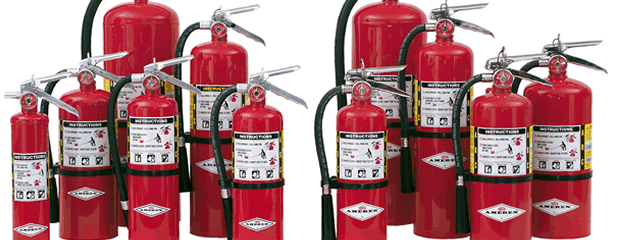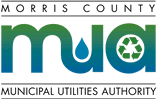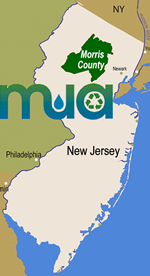Transfer Station Info (Tip Fee $113.00/ton)
- Mt. Olive Mon-Fri 7:30am-3pm; Sat 7:30am-11am
- Parsippany Mon-Fri 7am-3pm; Sat 7:30am-11am
- Closed Sundays and Major Holidays
- No Rental Trucks
- Payment by Account, Check, Credit Card. No Cash

F.A.Q. Fire Extinguishers
The MCMUA operates one of NJ's most comprehensive household hazardous waste (HHW) programs. This F.A.Q. page and information on hazardous materials is intended as a guide about HHW materials as well as the MCMUA's HHW program. This information is a general guide and does not constitute official rule, regulation or law.
Hazardous Waste Materials
- Adhesives
- Aerosols
- Antifreeze
- Appliances (CFCs)
- Art & Crafts
- Asbestos
- Batteries (Auto & Boat)
- Batteries, Household (dry cell)
- Cell Phones
- Compressed Gas Cylinders
- Driveway Sealer
- Electronics
- Fire Extinguishers
- Fluorescents
- Gasoline
- Medical Waste
- Kerosene
- Mercury
- Motor Oil & Filters
- Muriatic Acid (HCl)
- Paints & Stains
- Pesticides
- Photo Chemicals
- Pool Chemicals
- Propane
- Rock Salt
- Smoke Detectors
- Solvents
- Wood with Lead Paint
Hazards
- Contents are under pressure and may explode when combined with other materials.
-
Very old fire extinguishers may contain carbon tetrachloride, a known carcinogen.
Handling
- Two most common types include "dry chemical" (sodium bicarbonate or monoammonium phosphate) and carbon dioxide (CO2) both of which are not hazardous.
-
To empty contents, discharge outside, away from children or pets. Monoammonium phosphate is an irritant
to eyes and the respiratory tract. Wear goggles and particulate mask when discharging extinguisher.
Management Options
- Dry chemical extinguishers
- May be discharged in an area where an acidic fertilizer would be used such as around evergreens. Do not use on lawns.
- When relieving the pressure (emptying) the container for disposal, review manufacturers’ instructions, or, if unavailable, use the PASS technique
- Pull the pin: this unlocks the operating lever and allows you to discharge the extinguisher. Some extinguishers may have other seals or tamper indicators.
- Aim low: Point the extinguisher nozzle (or hose) at the base of the item.
- Squeeze the lever above the handle: this discharges the extinguishing agent. Releasing the lever will stop the discharge. (Some extinguishers have a button instead of a lever.)
- Sweep from side to side.
-
After pressure has been relieved (when nothing else comes out) remove the head from the container
and place it with scrap metal or in the trash.
-
Carbon dioxide extinguishers
- These extinguishers are refillable and should be refilled after each use. Check Yellow Pages under Fire Extinguishers – Recharging.
- If the extinguisher becomes defective, drill holes in the cylinder after pressure has been relieved and then place in the trash.
-
Ask fire equipment companies in your area if they will accept used extinguishers (listed in the Yellow Pages).
- Very old fire extinguishers
- Consult fire department.
-
Take to HHW collection or commercial hazardous waste facility.


